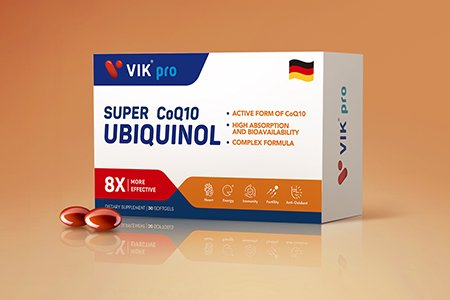Heart health is the guarantee of longevity, so we need to maintain heart health carefully if we want to live longer. The benefits of coenzyme Q10 to the heart have been known by more and more people. There are two forms of coenzyme Q10 in the human body, reductive and oxidative. Which form of coenzyme Q10 is more beneficial to the heart?
The difference between reducing coenzyme and oxidizing coenzyme is that the difference between the two forms of coenzyme lies in the bioavailability and the content. In terms of bioavailability, oxidized coenzyme Q10 needs to consume physical energy conversion to be absorbed and utilized, while reduced coenzyme Q10 can be directly absorbed and utilized; In terms of content, the content of oxidized coenzyme Q10 accounts for about 5% of the effective content in human body, while the content of reduced coenzyme Q10 accounts for 95%.

VIK®pro SUPER CoQ10 UBIQUINOL
Therefore, reducing coenzyme Q10 is more advantageous in terms of absorption and utilization. When selecting coenzyme Q10 products, it is necessary to pay attention to which type of coenzyme Q10 is. The middle-aged and elderly people are advised to choose the reduced coenzyme Q10 because of their poor absorption and metabolism.
In addition, different people have different needs for coenzyme Q10. The demand of the general population is relatively low, and the demand of cardiovascular disease and middle-aged and elderly people will be relatively large. When selecting coenzyme Q10 products, pay attention to the effective content, because the product specification does not represent the content of coenzyme Q10.

While supplementing coenzyme Q10 to protect the heart, we should also reduce and control the impact of other risk factors on heart health. These factors will weaken the effect of coenzyme Q10. Eating less high-fat and high-sugar foods, eating less high-cholesterol foods such as animal viscera, seafood, egg yolk, and smoking cessation and alcohol restriction will help reduce cardiovascular damage and maintain proper exercise.



